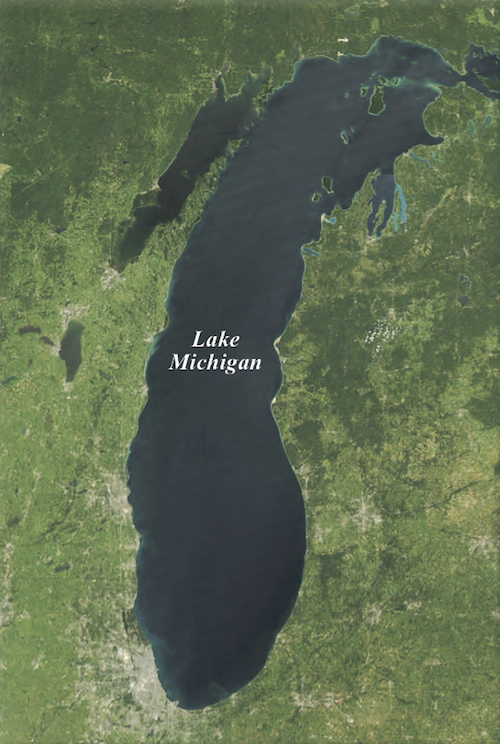Lake Michigan Diversion Application Review Released by Wisconsin DNR
Precedent-setting application will test the strength of the Great Lakes Compact
June 25, 2015 — Today the Wisconsin Department of Natural Resources (DNR) publicly released its draft review of the City of Waukesha‘s request to divert water from Lake Michigan—a move that could have ramifications for how the eight-state region of Wisconsin, Minnesota, Illinois, Indiana, Michigan, Ohio, New York, and Pennsylvania, including the Canadian provinces of Ontario and Quebec, manage the largest surface freshwater resource in the world, the Great Lakes. The City’s requested diversion is the first since the 2008 ratification of the Great Lakes Compact and Agreement—a pact between the eight states and two provinces to protect Great Lakes water and promote wise water use. The Compact generally bans the diversion of Great Lakes water, with some narrow exceptions. Conservation groups are raising significant questions about whether the City actually needs to divert Great Lakes water.
“The importance of this application cannot be overstated, as it will set a precedent for how the region will manage the Great Lakes now and for years to come,” said Marc Smith, policy director with National Wildlife Federation’s Great Lakes Regional Center. “The Great Lakes Compact is clear that diverting Great Lakes water is a last resort. The City of Waukesha has not proved conclusively that it really needs to divert Great Lakes water to meet its needs.”
Read the application here: http://1.usa.gov/1TOAFoD
Passed by all eight state legislatures, consented to by the U.S. Congress, and signed by President Bush in 2008, the Compact provides ironclad protections against diversions and requires water conservation measures to protect the Great Lakes. Waukesha is eligible under the Compact to apply for a diversion of Great Lakes water because the city lies within a county that straddles the Great Lakes and Mississippi River divide. Waukesha County in southeastern Wisconsin, is located 18 miles west of Milwaukee and Lake Michigan.
“Waukesha’s application to divert Lake Michigan water outside of the basin is the first test of the Great Lakes Compact since it was ratified in 2008,” said Molly Flanagan, Alliance for the Great Lakes Vice President for Policy. “Each of the Great Lakes states gets to decide whether it believes that Waukesha’s application meets the requirements of the Compact. We hope that each state will take this responsibility seriously and give the application a critical and thorough review.”
For several years, conservation groups around the region have questioned whether the City of Waukesha had considered all its options before seeking permission to divert Great Lakes water. A 2013 scientific analysis by the National Wildlife Federation concluded that the City could very likely meet its future needs without diverting water. Read the report at http://bit.ly/1TKQAUO.
The amount of water the City wants to divert also seems excessive. The city requests 10.1 million gallons per day on average from Lake Michigan. Yet, the City currently averages only 6 million gallons per day from its current sources.
In addition, the application includes towns in Waukesha County (Pewaukee and the Towns of Delafield and Waukesha, among others) that may not need water from Lake Michigan. To date, none of the communities in this “extended service area” has demonstrated that it is without adequate supplies of safe drinking water. Some officials in these areas have indicated that they do not need any water either now or in the foreseeable future. Including these towns in the application is therefore not consistent with the Great Lakes Compact. The Great Lakes Compact is clear that a need for water must exist in a community for it to be eligible for a diversion. If these areas are to be included as part of the application, the City must demonstrate that they meet all Compact requirements, including water conservation and efficiency before the application is finalized.
“Water conservation is a critical component of the Great Lakes Compact.” said Karen Hobbs, senior policy analyst with the Natural Resources Defense Council. “That’s because water conservation and efficiency are no-regret strategies – they protect our water resources, save residents money on utility bills and help our communities adjust to changing precipitation patterns.”
When the draft application is finalized by Wisconsin, the precedent-setting application must undergo regional review by the governors of the eight Great Lakes states of Illinois, Indiana, Michigan, Minnesota, Ohio, Pennsylvania, New York, and Wisconsin, as well as the Canadian premiers of Ontario and Quebec. Under the Compact, the Governors of all eight Great Lakes states must give their consent before the City’s application can be approved.
For more information, please visit: www.protectourgreatlakes.org
NOTE: This press release was submitted to Urban Milwaukee and was not written by an Urban Milwaukee writer. It has not been verified for its accuracy or completeness.
Mentioned in This Press Release
Recent Press Releases by Press Release
Rare Opportunity to see Experimental Dance and Media Installation by three choreographers
Mar 13th, 2024 by Press ReleaseOne night only in new alternative dance space in Milwaukee’s Fifth Ward




















